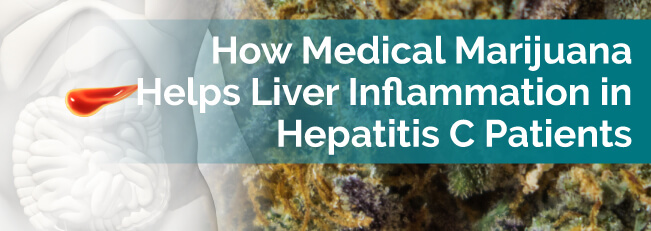
Your liver is an incredibly important part of your body. When you have hepatitis C, you have impaired liver function that makes it hard to get through your day-to-day tasks.
While we can’t totally cure hepatitis C with marijuana, we can use it to reduce your symptoms and make the treatment process easier for the patient.
The hepatitis C virus attacks the liver, causing scarring, liver cancer and even liver failure. You can contract the virus via the bloodstream from actions such as blood transfusions and tattoos. Since it only travels through blood, you can’t get the hepatitis C virus from touching an infected person or sharing food with them.
Since your liver filters the toxins in your body and helps the digestion process, hepatitis C severely impacts your bodily functions. Fortunately, a proper medication regimen usually cures the disease within a few months.
When hepatitis C inflames your liver, you can experience symptoms like:
As you can see, even though hepatitis C originally manifests in your liver, it affects your entire body, making it an illness that should be addressed as soon as possible.
Did you know our body makes chemicals similar to the ones found in marijuana? Cannabis has tons of cannabinoids that work together to provide a broad range of health benefits. Our brains have an endocannabinoid system that creates and receives cannabinoids from our bodies and outside sources like marijuana.
All throughout our bodies, we have cannabinoid receptors that take cannabinoids and translate them into different effects. We have two kinds of cannabinoid receptors — the CB1 receptor and the CB2 receptor. While the CB1 receptors mainly operate in your brain, the CB2 receptors operate in your immune system.
The immune system is responsible for inflammation. When our tissues get damaged, the immune system makes the tissue swell in an attempt to isolate the cause of the damage. While your body is trying to help you by inflaming tissue, inflammation can cause pain and other uncomfortable symptoms.
When the CB2 receptor takes in cannabinoids, it helps reduce inflammation by limiting the amount of inflammatory signals sent to the infected tissue. Your cells produce less substances that send inflammatory signals, or cytokines.
Some cannabinoids work better than others for reducing tissue inflammation. Beta-carophyllene can especially help inflammation by attaching to CB2 receptors only. This means it avoids the psychoactive effects that happen when cannabinoids attach to CB1 receptors in your brain.
Long story short, cannabis uses language your body understands to naturally limit the swelling in your liver, making the recovery process easier for you.
Marijuana doesn’t just soothe liver inflammation for hepatitis C patients — in fact, it serves as a holistic cure that reduces many of the symptoms associated with hepatitis C. Check out the following perks of using cannabis for hepatitis C:
Our resource library includes pages about the conditions that qualify for medical marijuana. Since hepatitis C qualifies in certain states, we also created a comprehensive guide on medical marijuana and hepatitis C.
To check if your state approves hepatitis C for marijuana treatment, we provide legal details about every state.
For more information about how cannabis can be used to treat Hepatitis C, check out our resources: